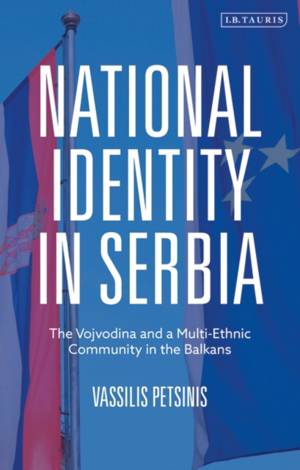
Je cadeautjes zeker op tijd in huis hebben voor de feestdagen? Kom langs in onze winkels en vind het perfecte geschenk!
- Afhalen na 1 uur in een winkel met voorraad
- Gratis thuislevering in België vanaf € 30
- Ruim aanbod met 7 miljoen producten
Je cadeautjes zeker op tijd in huis hebben voor de feestdagen? Kom langs in onze winkels en vind het perfecte geschenk!
- Afhalen na 1 uur in een winkel met voorraad
- Gratis thuislevering in België vanaf € 30
- Ruim aanbod met 7 miljoen producten
Zoeken
National Identity in Serbia The Vojvodina and a Multi-Ethnic Community in the Balkans
The Vojvodina and a Multi-Ethnic Community in the Balkans
Vassilis Petsinis
Hardcover | Engels
€ 254,45
+ 508 punten
Omschrijving
The autonomous province of Vojvodina in Serbia is little-known in the English-speaking world, even though it is a territory of high significance for the development of Serbian national identity. Vojvodina's multi-ethnic composition and historical experience has also encouraged the formation of a distinct regional identity. This book analyses the evolution of Vojvodina's identity over time and the unique pattern of ethnic relations in the province. Although approximately 25 ethnic communities live in Vojvodina, it is by no means a divided society. Intercultural cohabitation has been a living reality in the province for centuries and this largely accounts for the lack of ethnic conflict. Vassilis Petsinis explores Vojvodina's intercultural society and shows how this has facilitated the introduction of flexible and regionalized legal models for the management of ethnic relations in Serbia since the 2000s. He also discusses recent developments in the region, most notably the arrival of refugees from Syria and Iraq, and measures the impact that these changes have had on social stability and inter-group relations in the province.
Specificaties
Betrokkenen
- Auteur(s):
- Uitgeverij:
Inhoud
- Aantal bladzijden:
- 280
- Taal:
- Engels
Eigenschappen
- Productcode (EAN):
- 9781788313735
- Verschijningsdatum:
- 12/12/2019
- Uitvoering:
- Hardcover
- Formaat:
- Genaaid
- Afmetingen:
- 140 mm x 216 mm
- Gewicht:
- 467 g

Alleen bij Standaard Boekhandel
+ 508 punten op je klantenkaart van Standaard Boekhandel
Beoordelingen
We publiceren alleen reviews die voldoen aan de voorwaarden voor reviews. Bekijk onze voorwaarden voor reviews.









